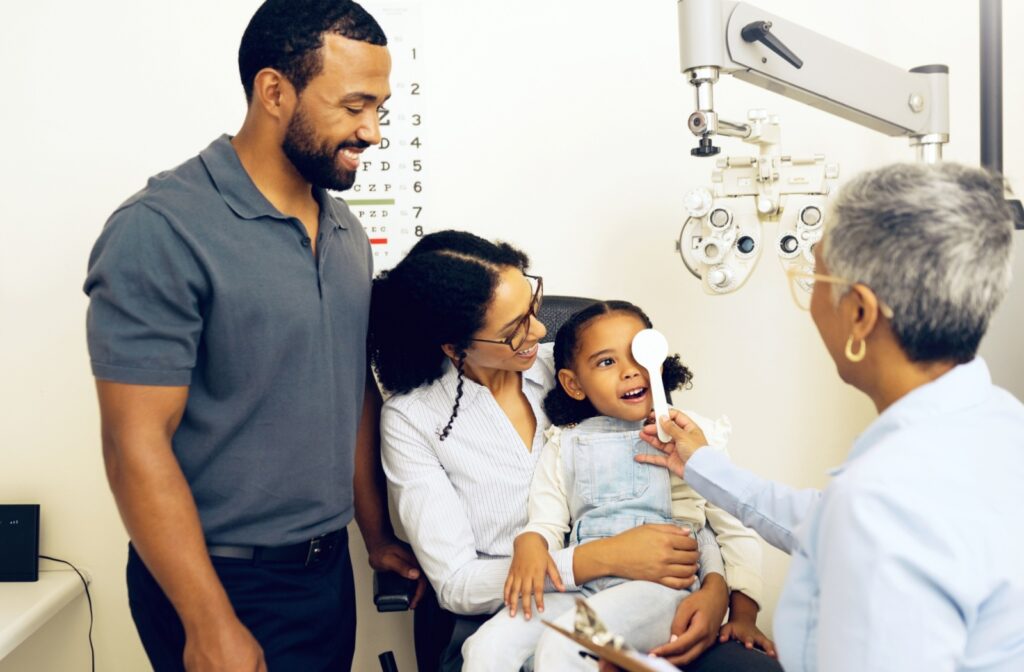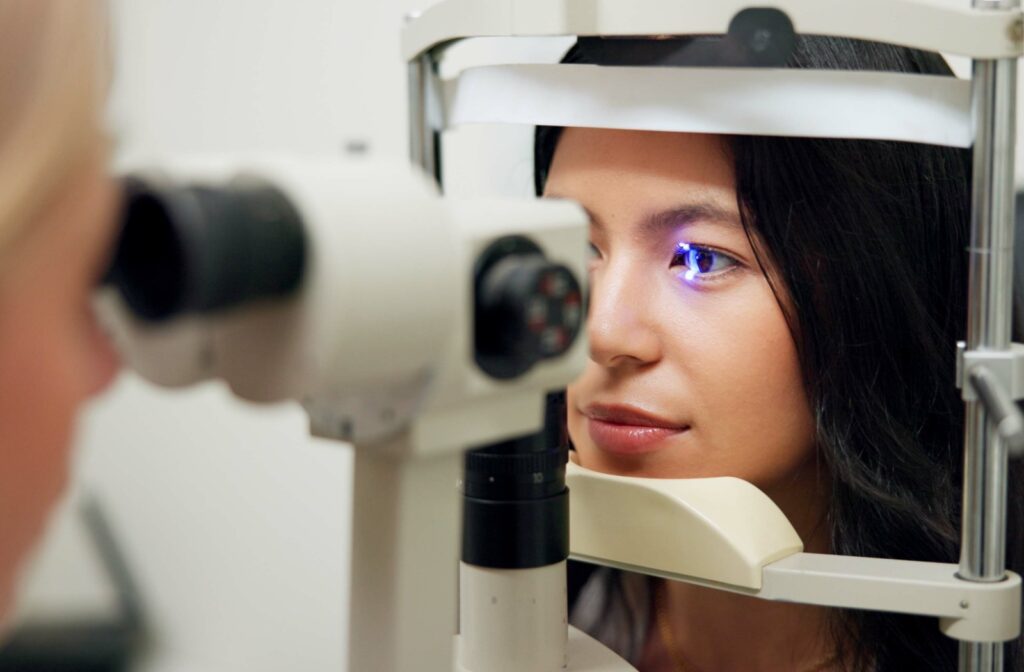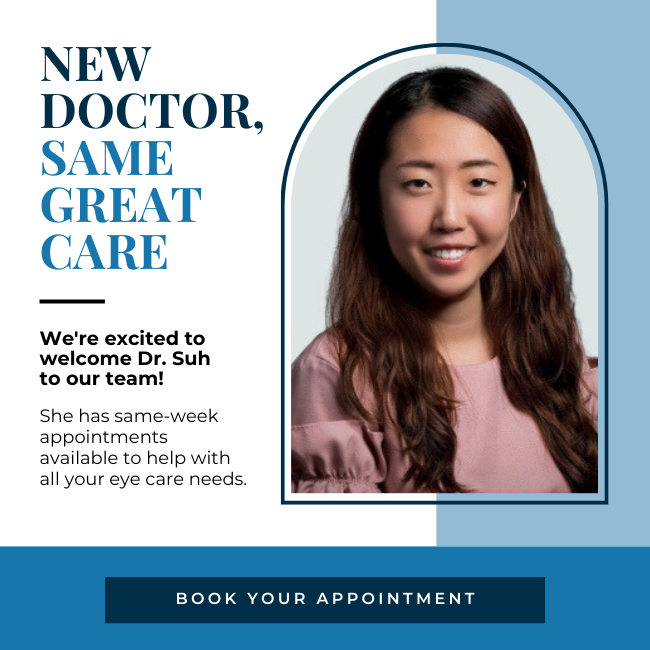Life can often feel like it’s moving at lightning speed, leaving little room for even essential appointments like eye exams. But your eyes play a crucial role in your daily life, from reading important emails to capturing precious family moments. Eye exams are about more than keeping your prescription up to date, they allow us to diagnose eye diseases before they become an issue.
A standard comprehensive eye exam typically takes about 30 minutes, but the benefits of keeping your vision and eye health in top shape can last a lifetime.
What Happens During a Comprehensive Eye Exam
A comprehensive eye exam serves as your eyes’ annual “health check-up.” It’s much more than reading the letters on a wall chart. Your optometrist evaluates your vision and checks for signs of various eye conditions, including glaucoma, cataracts, and macular degeneration. But the benefits don’t stop there. Comprehensive eye exams can also offer insights into potential general health concerns like diabetes or high blood pressure.
During the exam, your optometrist will:
- Assess your visual acuity and whether you need corrective lenses.
- Evaluate your overall eye health to catch early warning signs of eye diseases.
- Screen for underlying health conditions that may first show up in your eyes.
How Long Does Your Exam Take?
On average, a comprehensive eye exam lasts about 30 minutes, but the timing might vary based on your age and specific needs:
- Kids & Preteens often require extra time to assess their developing eyesight. Think of it as laying the foundation for a lifetime of healthy vision.
- Older Adults may need a longer evaluation as they’re more prone to age-related eye conditions like cataracts or macular degeneration.
Frequency matters too. Regular exams are vital for early detection and prevention:
- Children (0–19 years old) should have an eye exam within their first 6 months, another between ages 2 and 5, and annually throughout their school years.
- Adults (20–64 years old) should get a comprehensive exam every 2 years, unless they wear prescription lenses or have a specific medical condition that requires more frequent checkups.
- Seniors (65+ years old) should prioritize annual check-ups to monitor age-related changes.
Routine eye exams are your first line of defense in maintaining clear, healthy vision for all ages.
Contact Lens Exams
If you wear or plan to wear contact lenses, a standard eye exam won’t cut it. Contact lens exams require a specialized approach, helping your lenses fit comfortably and safely while delivering clear vision.
During a contact lens exam, your optometrist will:
- Take precise measurements of your eye to find the correct fit for your lenses.
- Provide training for first-time wearers to show you how to insert, remove, and care for your lenses.
- Offer trial lenses so you can test them before committing to a specific type.
Contact lens exams generally take 45 to 60 minutes, especially if this is your first time wearing them. This extra time is used to ensure a smooth and safe transition to contact lens use while addressing any concerns you might have. Whether you’re a seasoned wearer or just getting started, the process is designed to maximize comfort and confidence.

Diabetic Eye Exams
Eye health and diabetes are closely connected. Diabetes can lead to several eye conditions, including diabetic retinopathy, macular edema, cataracts, and glaucoma. Often, these conditions develop without noticeable symptoms until significant damage has occurred. That’s why diabetic eye exams are essential.
During a diabetic eye exam, you might undergo:
- A dilated eye exam, where your optometrist applies special drops to widen your pupils, allowing a detailed view of the retina and optic nerve.
- Imaging tests like optical coherence tomography (OCT) or fundus photography, which capture high-resolution images of your eye tissue.
A diabetic eye exam typically takes about 60 minutes, including the 20 minutes needed for the dilation drops to take effect. While it may take a bit longer than a standard exam, the thoroughness of this screening is invaluable in protecting your vision and overall eye health.
Do You Need Glaucoma Testing?
Glaucoma is a serious eye condition that can lead to permanent vision loss if left undetected and untreated. It’s often called the “silent thief of sight” because its early stages lack noticeable symptoms. That’s why testing for glaucoma is a vital part of regular eye exams.
Key tests used to detect glaucoma include:
- Tonometry to measure intraocular pressure (IOP).
- Visual field tests to check for blind spots or changes in peripheral vision.
- Optic nerve evaluation, using advanced technologies like OCT scans to monitor nerve health and retinal tissue.
Glaucoma tests are seamlessly integrated into most comprehensive eye exams, ensuring early detection and better management.
Proactive Eye Care for a Clear Future
Looking after your eye health doesn’t just improve your quality of life today; it also protects your vision for tomorrow. Routine eye exams, whether comprehensive, contact lens-specific, or tailored for conditions like diabetes and glaucoma, play a crucial role in proactive care.
Whether it’s your family’s first eye exam or you’re a long-time patient, Dr. Rehana Manji & Associates are here to provide personalized, thorough care to keep your vision thriving. Don’t wait another day to prioritize your eye health. Schedule your exam with us today and see the difference we can make together!


